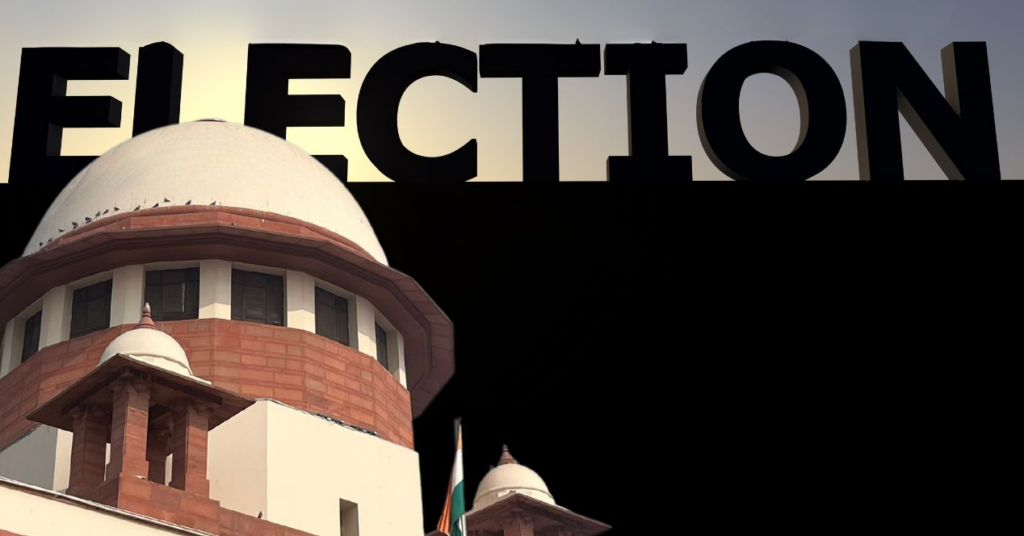Introduction
The Indian Supreme Court has again sounded the alarm on the increasing practice of political parties doling out election handouts—commonly called “freebies”—to voters with the intention of affect election results. Despite its political benefits, this practice has serious ethical and economic repercussions. The recent comments by the Court underpin the need for an organized debate on wonderful a balance between welfare measures and fiscal prudence.
This blog explores the Supreme Court’s stance, the economic and social consequences of election handouts, and potential solutions to this problem.
The Supreme Court’s Concerns
The Supreme Court has repeatedly voiced worry about political parties’ careless exploitation of giveaways. In its most recent findings, the Court pointed out that this type of development not only strains the economy but devastates the basis of democratic governance. Some of the main concerns expressed are:

Burden on Public Exchequer: Unchecked giveaways can result in unsustainable fiscal imbalances, plunging states into fiscal trouble.
Electoral Manipulation: Freebies can be used like a tool to manipulate electors instead of addressing long-term policy measures.
Undermining Democratic Processes: The freebie culture alters the priority from development and governance to short-term dividends.
Lack of Transparency: It is impossible to determine with sure if party leaders can keep their pledges without affecting your state’s-budget..
Understanding Election Handouts
What Are Election Handouts?
Election handouts are promises of free goods and services provided by political parties during their election campaigns. These may include:
Free electricity, water, and internet services
Straightforward money transfers
Free laptops, smartphones, and bicycles
Subsidized food grains and fuel
Waivers of farm loans
Free healthcare and education services
The Rationale Behind Handouts
These gifts, according to political parties, are a welfare program meant to lessen poverty & advance social justice. Some of the reasons are:
Bridging Socioeconomic Gaps: Basic services are made available to the impoverished through freebies.
Economic Stimulus: Giving money or goods can stimulate demand and stimulate fiscal works.
Correcting Market Failures: Basic services like healthcare and education are sometimes unavailable to a lot of the population.
But the boundary between welfare policies and populism is easily transgressed, and so there is a need to evaluate their long-term effects.
The Economic Impact of Election Handouts
Fiscal Burden about State-Governments
The main concern is the effect on the state-budget. The Comptroller and Auditor General (CAG) of India has repeatedly warned states about unmanageable budget imbalances because of runaway expenditure on freebies. Punjab, Tamil Nadu, and Andhra Pradesh have all gone through financial crises because of uncontrolled welfare schemes.
Short-Term Gains vs. Long-Term Consequences

Whereas handouts are immediate relief, they do not impact structural economic gain. Spending money on infrastructure, education, and creating jobs will have a much more lasting effect than handing out money one time.
Creating a Culture of Dependency
Overuse of government welfare can dissuade hard work and independence. It creates a society where people expect to be given free handouts instead of expecting good government and policy-making that will make the economy stronger.
The Political View
An Instrument of Election Advantages
Political parties tend to look at freebies in the role of good means to win votes. This can be seen especially in state-polls where the competition is intense, and the providing of free goods will decide the choice of a party.
The Role of Voter Behavior
In contrast to policy-based governing systems, most of voters, especially those from economically disadvantaged groups, view freebies in the role of tangible benefits. This maintains a trend where parties prioritize short-term agreements over long-term development.
Legal and Ethical Considerations
Though there are laws against illegal electoral practices, the handing out of election goodies is not explained in detail of bribes. The Election Commission of India (ECI) has made an effort to control this by requiring political parties to detail the cost implications of their promises in their manifestos. But this is weak on enforcement.
Possible Solutions
Recommendations of the Supreme Court
The Supreme Court has advocated the formation of a committee of experts to determine the limits of acceptable welfare schemes and formulate guidelines for putting a check on freebie distribution. Some of the suggested steps are:
Clear Policy Guidelines: Establishing what is acceptable in the role of welfare and what is an election freebie.
Independent Review Committees: Creating an independent committee to scrutinize the financial viability of promises by political parties.
Strengthened Election Commission Monitoring: Giving teeth to the ECI to control and penalize parties for providing unaffordable promises.
Public Awareness and Electoral Reforms
Educating citizens with knowledge on the economic impact of freebies can result in better-informed electoral options. Campaigns and debates on the long-term benefits of policies are necessary.
Laws pertaining to Fiscal Responsibility
Implementing stronger fiscal responsibility regulations at the State-level can halt governments from overspending on extravagant schemes. Welfare policies should be supported by finance planning under these regulations.
Performance-Based Governance

Promoting parties to emphasize governance, transparency, and sustainable growth over short-run incentives can change the political system into a responsible one.
Conclusion
The Supreme Court’s disapproval of election handouts is an important take action to uphold fiscal prudence and ethical leadership. Although welfare policies are indispensable for social justice, there has to be regulated, so that economic hardship is avoided and political exploitation does not occur. With tighter rules, increased public awareness, and responsible governance, India can development of a more stable and transparent electoral process.
The election handout debate is still to be concluded, but the intervention of the Supreme Court may be a watershed moment in recasting the approach of Indian politics towards voter welfare. The essence is to separate welfare measures that are responsible from populist measures that short-circuit long-term development.
